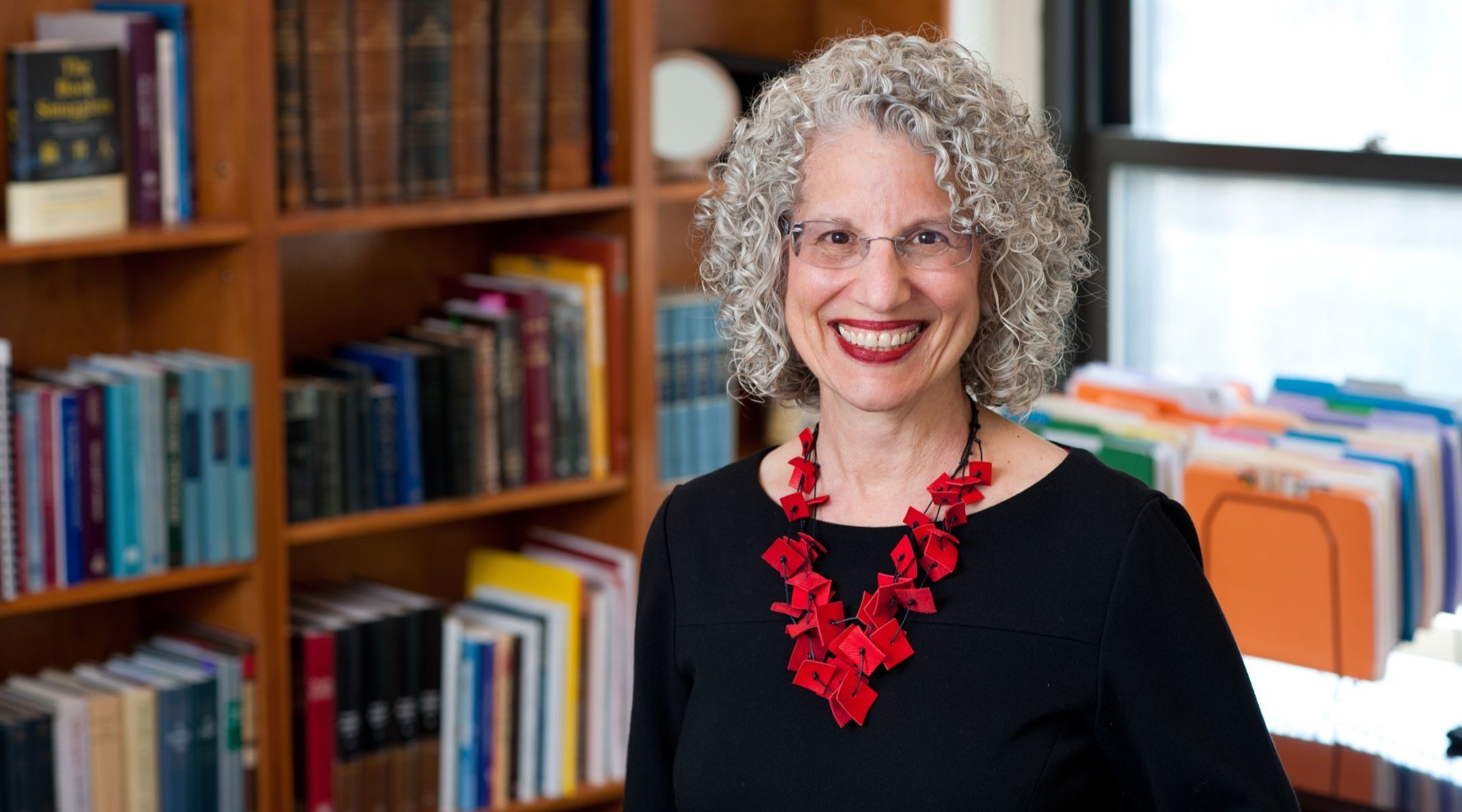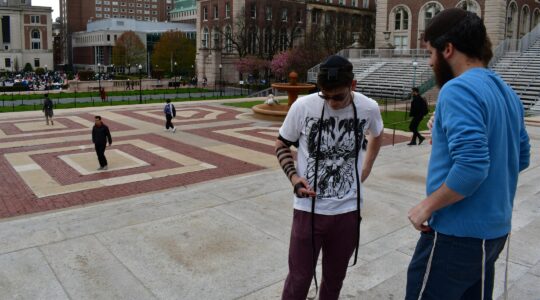(JTA) – Shuly Rubin Schwartz’s appointment as the Jewish Theological Seminary’s eighth chancellor comes just in time for the historian to guide the institution through a period of unprecedented crisis management.
The flagship university of Judaism’s Conservative movement recently completed a major renovation project of its Morningside Heights campus in New York City. The renovated building had been scheduled to open with fanfare March 22.
That dedication was canceled as the coronavirus pandemic first descended on the United States. Instead, the building sits empty as the seminary grapples with the uncertainty that all universities are facing right now: Should classes be held in person? Can students safely make their way to campus? Will donors be able to sustain their support?
Schwartz, who helped lead the transition to virtual learning back in March, believes her long history inside the institution makes her the right person to guide the school through a crisis.
“I know what needs to be done,” Schwartz, the first woman to lead the seminary in its 134-year history, told the Jewish Telegraphic Agency.
We spoke with Schwartz about her plans and the future of denominational affiliation.
JTA: How does it feel to assume this role at a time when there’s so much uncertainty due to the coronavirus pandemic? What are your goals as you assume this new position?
Schwartz: I have a long history with JTS – my parents are alumni, I am an alum, my late husband was an alum, and my son is a graduate of JTS and I built my career there for the last 30 years, so this is an institution that I am extremely dedicated to. And I’m now the provost, so I’ve been very involved in addressing the needs that have been posed by the pandemic in shifting us all to online learning in a matter of days. So I feel very grateful to be able to take on this role at this time. I know what needs to be done and I feel privileged to be able to serve in this capacity at this really difficult time.
The first goal is a very immediate one and that is, in a way, crisis management. What’s the fall going to look like? That’s what all institutions of higher ed are occupied with.
We’re predicated on building community as an academic community and as a Jewish community, so on the one hand we’ve learned pleasantly how to forge community in a virtual way. We had to do a lot of that in a triage way, now we have to be involved in the process of figuring out how to do that more planfully. I imagine we’ll do some kind of hybrid in terms of our teaching. Longer term, we have a new campus that is just about finished so my next goal is to get us back inhabiting that campus.
How are you thinking about that and how do you envision the seminary operating this fall?
The campus will enable us to enact a commitment to community, to Jewish learning in an environment of a living, vibrant Jewish community. It just so happens that it will help us with all of the new requirements that we couldn’t have imagined. We have a big new atrium that will make social distancing more possible than it would have before and there’s a new residence hall with single-use bathrooms. We didn’t do it with a pandemic in mind, but the design will be conducive to that.
One of the things we’ve learned over the last few months is that there are ways to greatly expand the reach of our community. So while our first priority are our degree students who are in house, there’s enormous opportunity out there in the world. There’s a lot of hunger out there for this kind of serious, critical, engaged Jewish learning that JTS offers. So I’m excited to think about ways to build on that so we can reach a much broader community.
My last important goal is to deepen the teaching we do in the area of ethics to help students grapple with the daunting ethical challenges of our age and to help them figure out how they will model those values in their social justice work.
You helped introduce a number of social justice initiatives at List College. Are there any projects you have in mind for rabbinical students at the seminary that have to do with social justice? What do you think should be the role of social justice work for Conservative rabbis and leaders?
I think it can play a role for all JTS students; only two of our schools are focused on training Conservative clergy. I think this is something that permeates our curriculum as a whole. There’s nowhere else where you can get a degree in Jewish ethics. I feel strongly that our work in ethics should come from a deep sense of understanding and commitment to our obligation as Jews and be involved in social justice.
You’re the third non-rabbi to be appointed chancellor at JTS. Do you think that says something about the future direction of leadership in the Conservative movement?
Leadership can take many different forms. And rabbinic leadership is so important, but it’s not the only avenue to Jewish leadership. I came of age in an era when I could not be ordained as a rabbi.
I see my leadership as having both an academic component and a religious component. I take that part of the role seriously. I’m a serious Jew, I care deeply about Jewish life and the Jewish future, I try to model that in my life. I think that that’s critically important in leadership at JTS, in addition to the No. 1, which is we’re an academic institution. So that I’m also a scholar and academic is critical, as well. I think the chancellor of JTS has multiple roles to play as a leader — there’s an academic role, there’s a religious role, there’s a role of being a moral voice out there in the world — and I think all of those roles are critical.
In a world where young people are less loyal to denominations than previous generations, how do you keep the Conservative movement relevant to the next generation? And to what extent do you view this demographic issue as part of your role at JTS?
I believe that American Judaism’s strength comes from the fact that there are so many different ways to express one’s Judaism and one’s Jewish identity, and all of these are important. I think that Conservative Judaism is a compelling approach to living an integrated life as an American and as a Jew, where both are important and where I don’t have to compartmentalize one part of my life or another in order to feel fully present. That form of Judaism has something very compelling to offer to Jews, whether they want to identify formally with a denomination or not. Joining groups is not so fashionable — that’s OK. I’m more concerned about the ideas, and what will inspire and ignite the passions of Jews to find their own way to connect meaningfully with Judaism and the Jewish people.
How does the proliferation of other rabbinical school options – Hadar, Hebrew College and American Jewish University – change the role of JTS?
If you think about the role that [rabbinical schools] played 70 years ago, the whole approach to leadership and to authority and to training, all of that was so different and you wanted your one place that would give you this one brand and would have the kind of quality control. Rabbis were so much more educated than the laity 70, 80 years ago. People were looking for a different kind of rabbi at that time than they are now. Jewish life is so much richer now. I think more is more, I think more engagement should lift all boats.
I think what JTS offers is unique, it has a distinctive approach to study, to the classical text. It’s certainly unique, there’s no other undergraduate program like it in the country. While Jewish studies has flourished in universities around the country, the way in which we do critical study would be inappropriate in a secular university. We’re doing this in a Jewish context, so you have the same rigor and critical scholarly approach you would have in a secular sphere but everyone is engaged in this project at JTS because the Jewish future matters to us.
I think the rabbinical program is distinctive because of our commitment to halacha and serious, critical academic study. That’s a rich combination that enables our students to speak deeply and authentically about the Jewish tradition from a place of commitment and a recognition of how that ought to then be translated into action in the world.
There’s no other Jewish institution that has all of these different kinds of leadership training programs under one roof. It’s the only place where you have together studying, hopefully under one roof, future rabbis, chazanim, educators, scholars and lay leaders who are all in this project of learning together.
Obviously you are taking over at a precarious moment financially. How are you preparing for this challenge?
Every institution of higher learning is revisiting its finances. We’re all in this together, we are monitoring it closely and we don’t know, we don’t have all the answers. I feel very fortunate that JTS has been around for 134 years, we have the kind of financial and physical resources that will enable us to figure this out. JTS has an endowment, it has a new building, the campus is beautiful and so we’re not fearful, we’re very well poised to meet these challenges.
The challenges are there. Enrollment looks great now, I hope that that continues. But so much is uncertain in terms of the public health challenges as we know. I think that JTS is strong and secure, and it’s also a relatively small institution, so it will be able to pivot more quickly to be back on campus more quickly.






